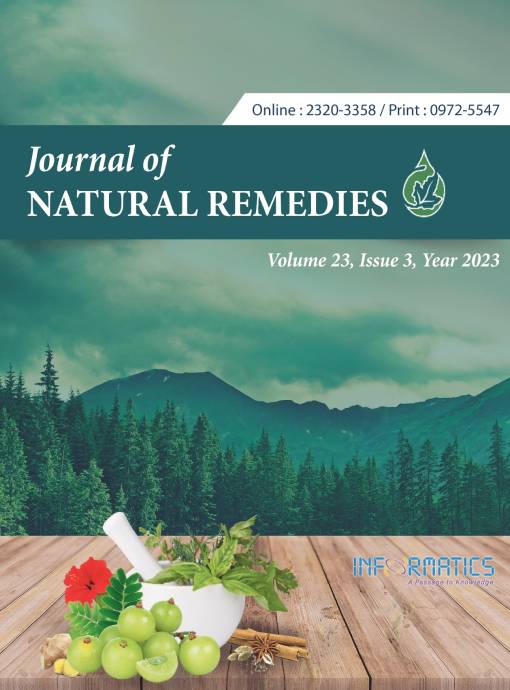Formulation Development and Evaluation of a Polyherbal Suspension Containing Curcuma longa, Ocimum sanctum and Azadirachta indica with Improved Antimicrobial Activity
DOI:
https://doi.org/10.18311/jnr/2023/33332Keywords:
Antimicrobial, Polyherbal Formulation, TuberculosisAbstract
A lack of global political will to mobilise resource to fight tuberculosis is major challenge in ending tuberculosis. The polyherbal formulations are best alternative, as they are economic, environmentally friendly and easily available than modern drugs. In present study, a polyherbal suspension with extracts of C. longa, A. indica and O. sanctum was developed and characterized. The developed suspension was found satisfactory with respect to odour, colour, taste, pourability, pH, viscosity, zero microbial count, particle size, percentage ease of disposability, aesthetic characteristic, sedimentation, zeta potential and does not show the crystal growth, polyherbal formulation exhibited significantly inhibited the growth of H37Rv and MIC is also comparable to those of standard agents.
Downloads
Metrics
Downloads
Published
How to Cite
Issue
Section
License
Copyright (c) 2022 R. S. Shivarkar, S. B. Bhise, V. Rama Mohan Gupta, N. S. Kulkarni, M. C. Upadhye (Author)

This work is licensed under a Creative Commons Attribution 4.0 International License.
Accepted 2023-06-26
Published 2023-07-28
References
World Health Organization Global Tuberculosis Report 2022, 1-1.
Abraham García. Recent advances in anti-tubercular natural products. European Journal of Medicinal Chemistry. 2012; 49:1-23. https://doi.org/10.1016/j. ejmech.2011.12.029 PMid:22280816. DOI: https://doi.org/10.1016/j.ejmech.2011.12.029
Raju Gautam. Indian medicinal plants as a source of antimycobacterial agents. Journal of Ethnopharmacology. 2007; 110:200-34. https://doi. org/10.1016/j.jep.2006.12.031 PMid:17276637.
Chan ED., Iseman MD. Current medical treatment for tuberculosis. British Medical Journal. 2002; 325:1282– 6. https://doi.org/10.1136/bmj.325.7375.1282 PMid: 12458250 PMCid:PMC1124748. DOI: https://doi.org/10.1136/bmj.325.7375.1282
Tripathi RP, Tewari N, Dwivedi N, Tiwari VK. Fighting tuberculosis: an old disease with new challenges. Medicinal Research Reviews. 2005; 25; 93–131. https://doi.org/10.1002/med.20017 PMid: 15389729. DOI: https://doi.org/10.1002/med.20017
Gautam R, Saklani A, Jachak S. Indian medicinal plants as a source of antimycobacterial agents. Journal of Ethnopharmacology. 2007; 110:200–34. https:// doi.org/10.1016/j.jep.2006.12.031 PMid:17276637. DOI: https://doi.org/10.1016/j.jep.2006.12.031
Sandra MN, Chara L, Wright CW. The Evaluation of forty-three plant species for in vitro antimycobacterial activities; isolation of active constituents from Psoralea corylifolia and Sanguinaria canadensis. Journal of Ethanopharmacology. 2002; 79:57-67. https://doi.org/10.1016/S0378-8741(01)00350-6 PMid:11744296. DOI: https://doi.org/10.1016/S0378-8741(01)00350-6
Pandey G. Active principles and median lethal dose of Curcuma longa Linn. In Research Journal of Pharmaceutics. 2011; 2(5):239-41.
Ansel HC, Allen LV. Pharmaceutical dosage forms and drug delivery systems. Lippincott. 2000; 347-56.
Gandhi NR, Andrews JR, Brust J, Montreuil CM, Weissman RD, Heo M, Moll AP, Friedland GH, Shah NS. Risk factors for mortality among MDRand XDR-TB patients in a high HIV prevalence setting. Int J Tuberc Lung Dis. 2012; 16(1):90-7. https://doi.org/10.5588/ijtld.11.0153 PMid:22236852 PMCid:PMC3302205. DOI: https://doi.org/10.5588/ijtld.11.0153
Kho K, Hadinoto K. Aqueous re-dispersibility characterization of spray-dried hollow spherical silica nanoaggregates. Powder Technology. 2010; 198(3):354-63. https://doi.org/10.1016/j.powtec.2009. 11.031 DOI: https://doi.org/10.1016/j.powtec.2009.11.031
De Camargo IL, Morais MM, Fortulan CA, Branciforti MC. A review on the rheological behavior and formulations of ceramic suspensions for vat photopolymerization. Ceramics International. 2021; 47(9):11906-21. https://doi.org/10.1016/j. ceramint.2021.01.031 DOI: https://doi.org/10.1016/j.ceramint.2021.01.031
Keller JD. Sodium carboxymethylcellulose (CMC). In Food hydrocolloids. CRC Press. 2020; p. 43-109. https://doi.org/10.1201/9780429290459-4 PMCid:PMC6977157 DOI: https://doi.org/10.1201/9780429290459-4
Toropainen E, Fraser-Miller SJ, Novakovic D, Del Amo EM, Vellonen KS, Ruponen M, Viitala T, Korhonen O, Auriola S, Hellinen L, Reinisalo M. Biopharmaceutics of topical ophthalmic suspensions: Importance of viscosity and particle size in ocular absorption of indomethacin. Pharmaceutics. 2021; 13(4):452. https://doi.org/ 10.3390/pharmaceutics13040452 PMid:33810564 PMCid:PMC8067094. DOI: https://doi.org/10.3390/pharmaceutics13040452

 R. S. Shivarkar
R. S. Shivarkar









 0.35
0.35 24
24 0.161
0.161